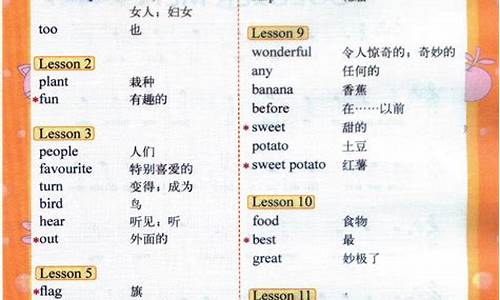您现在的位置是: 首页 > 正能量的句子 正能量的句子
三年级下英语句子表_三年级英语句子表精选
tamoadmin 2024-08-25 人已围观
简介1.三年级英文**句子和单词的有哪些?2.需要用三年级英语单词造2句主+谓语+间接宾语+直接宾语的句子。3.小学三年级英语按顺序排列下面的句子4.小学三年级英语重点句子知识点5.人教版小学英语三年级、四年级、五年级、六年级上下册有哪些四会单词、四会句子6.小学三年级英语语法知识三篇一.开头句型1.As far as ...is concerned 就……而言 比如说:就我而言 As far as
1.三年级英文**句子和单词的有哪些?
2.需要用三年级英语单词造2句主+谓语+间接宾语+直接宾语的句子。
3.小学三年级英语按顺序排列下面的句子
4.小学三年级英语重点句子知识点
5.人教版小学英语三年级、四年级、五年级、六年级上下册有哪些四会单词、四会句子
6.小学三年级英语语法知识三篇

一.开头句型
1.As far as ...is concerned 就……而言 比如说:就我而言 As far as I concerned 2 It can be said with certainty that... +从句 可以肯定地说......
3.As the proverb says, 正如谚语所说的, 可以用来引用名言名句
4 .It has to be noticed that... 它必须注意到,...
5 .Its generally recognized that... 它普遍认为...
6 .Its likely that ... 这可能是因为...
7 .Its hardly that... 这是很难的......
8 Theres no denying the fact that...毫无疑问,无可否认
9 .Nothing is more important than the fact that... 没有什么比这更重要的是…
10 .whats far more important is that... 更重要的是…
二.衔接句型
1.A case in point is ... 一个典型的例子是...
3 But the problem is not so simple. Therefore,+句子 ( 然而问题并非如此简单,所以……) 4 .But its a pity that... 但遗憾的是… it’s a pity that….遗憾的是。。。
5 In spite of the fact that...尽管事实...... In spite of 尽管
6 .Further, we hold opinion that... 此外,我们坚持认为,...
7 .However , the difficulty lies in..+名词或者动名词 .然而,困难在于…
8.Similarly, we should pay attention to... 同样,我们要注意...
9 As it has been mentioned above...正如上面所提到的… (可以用来对前面所说的话进行补充说明)
10.In this respect, 从这个角度上
11.However, 然而…
三.结尾句型
1.I will conclude by saying... 最后我要说…
2.Therefore, we he the reason to believe that...因此,我们有理由相信…
3.All things considered,总而言之 = In a word=In conclusion
It may be safely said that...它可以有把握地说......
4.Therefore, in my opinion,因此,在我看来,
5.From what has been discussed above, we may safely draw the conclusion that….通过以上讨论,我们可以得出结论…
6.The data/statistics/figures lead us to the conclusion that….通过数据我们得到的结论是,....
7.It can be concluded from the discussion that...从中我们可以得出这样的结论
8.From my point of view, it would be better if...在我看来,如果……也许更好
四.举例句型
1. Here is one more example这里有不止一个的例子
2.Take … for example.就拿……为例子
五.常用于引言段的句型
1. Some people think that …. 有些人认为…
To be frank, I can not agree with their opinion for the reasons below. 坦率地说,我不能同意他们的意见,理由如下。
2. I believe the title statement is valid because…. 我认为这个论点是正确的,因为… 1
3. I cannot entirely agree with the idea that ….我无法完全同意….这一观点的说法…
4. Along with the development of…, more and more….随着……的发展,越来越多…
5 It is commonly/generally/widely/ believed /held/accepted/recognized that….它通常是认为…
6. As far as I am concerned, I completely agree with the former/ the latter.就我而言,我完全同意前者/后者的观点。
六 表示比较和对比的常用句型和表达法
1. A is completely different from B. (A和B完全不同)
2 The difference between A and B is lies in +名词或者动名词 ( A和B不同的地方是。。。) .
七 演绎法常用的句型
1. There are several reasons for…, but in general, they come down to three major ones.有几个原因……,但一般,他们可以归结为三个主要的。
2. Many ways can contribute to solving this problem, but the following ones may be most effective.有很多方法可以解决这个问题,但下面的可能是最有效的。 ( 可以用在保护环境等话题的作文)
4. Generally, the advantages can be listed as follows.一般来说,这些优势可以列举如下。
5. The reasons are as follows. 。。。的理由如下 (可以用来列举理由原因)
八 因果推理法常用句型
1.Because/Since we read the book, we he learned a lot. 由于阅读这本书,我们已经学到了很多。
2. If we read the book, we would learn a lot. 由于阅读这本书,我们已经学到了很多。
3. We read the book; as a result / therefore / thus / hence / consequently / for this reason / because of this, weve learned a lot. 由于阅读这本书,我们已经学到了很多。
4. As a result of /Because of/Due to/Owing to reading the book, weve learned a lot. 由于阅读这本书,我们已经学到了很多。
更多内容推荐
1.英语六级作文万能模板句子
2.英语四级作文结尾万能句型
3.中考英语万能金句精选
4.英语六级作文万能模板
5.高考英语必备万能句型
6.英语四级作文万能模板
7.高考英语作文万能金句
8.中考英语作文万能句型
9.高考英语作文万能模板
10.四级作文万能模板完整版
韩芳沫
回复 2 楼 2014-12-19
(一)段首句
1. 关于……人们有不同的观点。一些人认为…… There are different opinions among people as to ____ .Some people suggest that ____.
2. 俗话说(常言道)……,它是我们前辈的经历,但是,即使在今天,它在许多场合仍然适用。 There is an old saying______. It’s the experience of our forefathers,however,it is correct in many cases even today.
3. 现在,……,它们给我们的日常生活带来了许多危害。首先,……;其次,……。更为糟糕的是……。 Today, ____, which he brought a lot of harms in our daily life. First, ____ Second,____. What makes things worse is that______.
4. 现在,……很普遍,许多人喜欢……,因为……,另外(而且)……。 Nowadays,it is common to ______. Many people like ______ because ______. Besides,______.
5. 任何事物都是有两面性,……也不例外。它既有有利的一面,也有不利的一面。 Everything has two sides and ______ is not an exception,it has both advantages and disadvantages.
6. 关于……人们的观点各不相同,一些人认为(说)……,在他们看来,…… People’s opinions about ______ vary from person to person. Some people say that ______.To them,_____.
7. 人类正面临着一个严重的问题……,这个问题变得越来越严重。 Man is now facing a big problem ______ which is becoming more and more serious.
8. ……已成为人的关注的热门话题,特别是在年青人当中,将引发激烈的辩论。 ______ has become a hot topic among people,especially among the young and heated debates are right on their way.
9. ……在我们的日常生活中起着越来越重要的作用,它给我们带来了许多好处,但同时也引发一些严重的问题。 ______ has been playing an increasingly important role in our day-to-day life. it has brought us a lot of benefits but has created some serious problems as well.
10. 根据图表/数字/统计数字/表格中的百分比/图表/条形图/成形图可以看出……。很显然……,但是为什么呢? According to the figure/number/statistics/percentages in the /chart/bar graph/line/graph,it can be seen that______ while. Obviously,______,but why?
(二)中间段落句
1. 相反,有一些人赞成……,他们相信……,而且,他们认为……。 On the contrary,there are some people in for of ___.At the same time,they say____.
2. 但是,我认为这不是解决……的好方法,比如……。最糟糕的是……。 But I don’t think it is a very good way to solve ____.For example,____.Worst of all,___.
3. ……对我们国家的发展和建设是必不可少的,(也是)非常重要的。首先,……。而且……,最重要的是…… ______is necessary and important to our country’s development and construction. First,______.What’s more, _____.Most important of all,______.
4. 有几个可供我们纳的方法。首先,我们可以……。 There are several measures for us to adopt. First, we can______
5. 面临……,我们应该取一系列行之有效的方法来……。一方面……,另一方面, Confronted with______,we should take a series of effective measures to______. For one thing,______For another,______
6. 早就应该拿出行动了。比如说……,另外……。所有这些方法肯定会……。 It is high time that something was done about it. For example. _____.In addition. _____.All these measures will certainly______.
7. 为什么……?第一个原因是……;第二个原因是……;第三个原因是……。总的来说,……的主要原因是由于…… Why______? The first reason is that ______.The second reason is ______.The third is ______.For all this, the main cause of ______due to ______.
8. 然而,正如任何事物都有好坏两个方面一样,……也有它的不利的一面,象……。 However, just like everything has both its good and bad sides, ______also has its own disadvantages, such as ______.
9. 尽管如此,我相信……更有利。 Nonetheless, I believe that ______is more advantageous.
10. 完全同意……这种观点(陈述),主要理由如下: I fully agree with the statement that ______ because______.
(三)结尾句
1. 至于我,在某种程度上我同意后面的观点,我认为…… As far as I am concerned, I agree with the latter opinion to some extent. I think that ____.
2. 总而言之,整个社会应该密切关注……这个问题。只有这样,我们才能在将来……。 In a word, the whole society should pay close attention to the problem of ______.Only in this way can ______in the future.
3. 但是,……和……都有它们各自的优势(好处)。例如,……,而……。然而,把这两者相比较,我更倾向于(喜欢)…… But ______and ______he their own advantages. For example, _____, while_____. Comparing this with that, however, I prefer to______.
4. 就我个人而言,我相信……,因此,我坚信美好的未来正等着我们。因为…… Personally,
I believe that_____. Consequently, I’m confident that a bright future is awaiting us because______.
5. 随着社会的发展,……。因此,迫切需要……。如果每个人都愿为社会贡献自已的一份力量,这个社会将要变得越来越好。 With the development of society, ______.So it’s urgent and necessary to ____.If every member is willing to contribute himself to the society, it will be better and better.
6. 至于我(对我来说,就我而言),我认为……更合理。只有这样,我们才能…… For my part, I think it reasonable to_____. Only in this way can you _____.
7. 对我来说,我认为有必要……。原因如下:第一,……; 第二,……;最后……但同样重要的是…… In my opinion, I think it necessary to____. The reasons are as follows. First _____.Second ______. Last but not least,______.
8. 在总体上很难说……是好还是坏,因为它在很大程度上取决于……的形势。然而,就我个人而言,我发现……。 It is difficult to say whether _____is good or not in general as it depends very much on the situation of______. However, from a personal point of view find______.
9. 综上所述,我们可以清楚地得出结论…… From what has been discussed above, we may reasonably arrive at the conclusion that____.
三年级英文**句子和单词的有哪些?
英语的基本句型归纳起来有五种,它们是主-动-补(SVC)结构,主-动结构(SV),主-动-宾(SVO)结构,主-动-宾-宾结构(SVOO),主-动-宾-补(SVOC)结构。当代有些语法书在上述五种基本句型之外,再加两种,这样就形成了七种。七种句型的划分是有其独到之处的,因为状语在由某些动词构成的句子中是不可缺少的成分。现就七种句型分述如下:
1.主—动—补结构(SVC)。此种结构中的动词皆是连系动词。连系动词带有的主语补语可以是名词词组。形容词词组。介词词组。非限定动词词组或名词性分句等。例如:
The
twin
are
as
like
as
two
pears.
She
is
in
good
health.
It
is
getting
dark.
The
machine
is
out
of
order.
2.主—动(SV)结构。此种结构中的动词一般是不及物动词,在这种句型中,状语并非是结构上不可或缺的成分。例如:
He
lives
in
Shanghai.
We
get
up
early
every
day.
The
train
lees
at
eight.
They
he
been
singing
for
half
an
hour.
3.主—动—宾结构(SVO)。此种结构中的动词都是及物动词,这类动词后面一般只跟一个宾语,因此也叫做单宾语及物动词(monotransitive
verb),该句型一般不需状语成分即可表达
完整思想。例如:
She
is
reading
a
novel.
We
he
realized
the
importance
of
English.
They
are
watching
the
football
match.
He
opened
the
door.
需要用三年级英语单词造2句主+谓语+间接宾语+直接宾语的句子。
三年才刚刚接触英语,要让三年级的小学生理解英语句子是比较难的,还是打好基础比较好。句子不用过于着急地去学,首先应该从单词语法等等抓起。三年级英语单词有:
一、动物:20个
Monkey . cat , dog.duck、pig、rabbit、panda、bear、mouse、bird、kangaroo、lion、mosquito、owl、
parrot、quail、rooster、elephant、tiger、zebra二、学习用品:23
bag、book、ball、box、chair、Chinese book、classroom、crayon、desk、Englishbook、eraser、glue、kite、marker、pen、pencil、pencil-box、ruler、scissors、sharpener.storybook、watch、water bottle
三、食物:17
bread、cake、 candy、chicken、doughnut、egg. hamburger、coffee、coke、honey.hot dog.ice cream、jam、 juice、noodles、rice、water
四、水果fruits (6)
le banana pear grapes mango orange五、颜色colour (11)
red blue green yellow purple brown white black pink orange grey
小学三年级英语按顺序排列下面的句子
1.Hegemeanle.=Hegeanletome.他给了我一个苹果。2.Mymotherboughtmeanewschoolbagyesterday.=Mymotherboughtanewschoolbagformeyesterday. 妈妈昨天给我买了一个新书包。3.Isentheraletterlastweek.=Isentalettertoherlastweek.上周我给她发了一封信。注:主语(名词,代词,不定式短语,动名词等充当)谓语(及物动词)间接宾语(一般是人)直接宾语 (一般是物)即主语+及物动词+sbsth= 主语+及物动词+sth+介词+sb
小学三年级英语重点句子知识点
为你解答。
1、C.Hi,Chen Jie.I he a new pencil box !
2、A.Oh,how beautiful !
3、B.Can I he a look ?
4、E.Sure. Here you are .
5、D.Thank you .
人教版小学英语三年级、四年级、五年级、六年级上下册有哪些四会单词、四会句子
#小学英语# 导语词汇量是制约外语学习效率的最重要因素。词汇是构成语言的最基本材料,是英语的根基,始终贯穿于英语学习的整个过程,是其他方面学习的根本性前提,即单词高于一切!强化单词学习的重要紧迫性不言而喻!以下是 整理的相关资料,希望帮助到您。 篇一 1. 介词“on?” “in?”的短语
on the chair/in the pencil-box/in the desk/in the bag/in the sky
2. 特殊疑问句“where”“what”“who”的用法
①特殊疑问句“where”的用法:
Where is …? ----It?s on…. / It?s in….
②特殊疑问句“what”的用法:
What?s on the table? — A plate of cakes.
③特殊疑问句“who”的用法:.
Who is he/she? He/ She is….
They are brother and sister.
当不知道是谁时,人称代词用it:
Who is it? ----- It?s me.
3. 感叹句用what和how: what修饰名词;how修饰形容词
How nice on a ship! How nice!
What a fine day! What a big cake! 篇二
1.let’s 句型:let?s =let us
Let?s make a blouse/vest.
Let?s run a race. /Let?s play games.
Let?s ride it.
Let?s give her nice things.
Let?s sing“Hy Birthday to You”.
Let?s count the candles.
Let me help you.
Let me open/close the door.
Let me get the les/pears.
Let?s go home.
2. can句型:
We can?t let him in.
She can’t swim.
I can?t find/see….
Can she swim? Yes, she can. / No, she can’t.
Can you make cakes? Yes, I can. / No, I can?t.
Can you fly it? —Of course,I can.
3.主语是单数第三人称,谓语动词加“s”:
look like 看起来像
She looks like Steve.
Steve is Eve’s brother.
I like him, and he likes me.
4.“he”的用法:
①“he”表示“有”
I he a kite/ a new bike.
We he some nice things for you.
②“he”表示“吃”
He a coke/an le. —Yes, thank you./ No, thanks.
Please he the cake. —Thank you.
Let?s he the good things.
小学三年级英语语法知识三篇
6B词组(1)Unit 1
1. on Sunday morning 在星期天早晨 2. go for a walk 去散步
3. take a walk 散步 4.Do you\they look the same ?你们\他们看起来一样吗?
5. be glad to see them 很高兴见到他们
6. under a big tree 在一棵大树下 7. he a chat 聊天
8. a twin sister 双胞胎姐姐/妹妹 9. twin sisters\brothers 双胞胎姐妹 \兄弟 10. as tall as 和…一样高 11. look the same 看上去一样
12.ten years old十岁13. twenty minutes younger\older than… 比…小\大二十分钟
14. want to do sth. 想做某事 15. one day 某一天
16. the only child in my family 我家的独生子
17. the man in black 穿着黑色衣服的男人
the girl in the yellow T-shirt 穿**T恤的女孩。
18 Who’s younger, you or Su Yang? 谁年龄小,你还是苏扬?
19. Do you he any brothers or sisters? 你有兄弟姐妹吗?
Does he he any brothers or sisters? 他有兄弟姐妹吗(三单)
20. He’s one year younger\older than me. 他比我小\大一岁。
21. You’ve got a brother. 你有一个哥哥。
22. I’m taller than Su Yang. 我比苏扬高。
23. Who’s taller than Did? 谁比Did高? Mike is.
24. Whose school bag is heier, yours or mine? 谁的书包重,你的还是我的?Mine is.
Unit 2
1. be good at 擅长 2. be good at Chinese\PE擅长语文\体育
3.Be good at dancing\singing\running 擅长跳舞\唱歌、跑步
4.am \is\are not good at 不擅长 5.be better at 更擅长(than)
6. do well in 在……方面做得好7.do well in Chinese\English在语文、英语方面做得好9.do well in swimming\jumping在游泳、跳高方面做得好
9. don’t \doesn’t(三单)do well in 在……方面做得不好
10.do better in 在……方面做得更好(than)
11. talk to sb. about sth. 和某人谈有关某方面的情况
12. need help with English 在英语方面需要帮助
13. run faster than… 比……跑得快
14. a good football player 一位好的足球运动员
15. some of the boys 其中一些男孩
16. Don’t worry. 不用担心。
17. do some exercise 做练习/做运动 do more exercise 多做练习/运动
18. get stronger 变得更健壮 19. jog to school 慢跑去学校
20. play ball games 玩球类运动 21. all of us 我们所有人
22 some of us我们中一些人 23. be late for school 上学迟到
24. What’s the matter? 怎么了? = What’s wrong with with you?
25. I’ll get up earlier every day and do some exercise before I go to school. 我会在每天早点起床,上学前做些运动。
26. Please don’t be late again. 请下次别再迟到。
27. Shall we start our lesson now? 我们现在开始上课吧?
28. You he five minutes to remember them. 你们有五分钟的时间来记住他们。29.good idea 好主意 30.see sb.doing sth看见sb做sth
31.Do the boys\they jump higher than the girls? Yes,they do.
32.Does Jim swim slower than Did? No,he doesn’t.He swims faster than Did.
Unit 3
1. Excuse me, can you tell me the way to …? 请问,你能告诉我去……的路吗?
2. go\run along this street 沿着这条街走\ 跑 3. turn right/left 向右/左拐
4. at the first crossing 在第一个十字路口
5. on your left/right 在你的左/右边 6. take bus No. 5 坐5路车by bus 乘公共汽车
7. a long walk一段很长的路
8. there’s a bus every five minutes 每5分钟有一辆公交车
9. in front of 在……前面 10. get off 下车 get on上车
11. at the first\second\third stop 在第一\二\三站
12. the History Museum历史博物馆 13. a shopping centre 购物中心
14. a post office 邮局 15. a middle school 中学
16. a primary school 小学 17. a train station 火车站
18. last Sunday afternoon 上个星期天下午19. a book about animals 有关动物的书
20. run out of 跑出…… 21. stop thief 抓贼
22. start to run 开始跑 23. get sth. back 把某物拿回
24. come to help 来帮忙 33.get sth. out of 把sth.拿出……
25. He’s asking Yang Ling how to get there. 他在问杨凌怎么去那儿。
26.How can I get to the shopping centre?我如何到购物中心?
27.You can’t miss it. 你不会错过的。28. How far is it from here? 离这儿有多远?
29. about a kilometer away. 大约一公里远。 30.get there faster 更快到达那儿。 31.in Zongshan street 在中山街上 32.on Huaihai Road 在淮海路上
Unit 5
1. be going to do sth 将做某事 2. next week 下个星期
3. work there for one year 在那工作一年 4. want to know about sth 想知道某事
5.ask some questions about the weather 问许多关于天气的问题。
6.What’s the weather like in spring 春天天气怎样?
It’s …….What do you usually do? I usually go rowing and fishing.
What does he usually do?He usually goes rowing and fishing.
7. in spring/summer/autumn/winter 在春天/夏天/秋天/冬天
8. in the countryside 在乡村 9. in New York在纽约
10.go to farms in the countryside 去乡村农场。11.pick les \oranges\peaches摘12.Sounds great! 听起来很棒!13. It’s warm most of the time 大部分时间是温暖的
14.Does it often rain there?那儿经常下雨吗?It often rains there. 那儿经常下雨。(三单) It is often rainy there.那儿经常是下雨天。(表示天气) It is raining there now.那儿现在正下雨。(现在进行时)
15. make snowmen with my friends 和我的朋友一起堆雪人
16. It’s great fun. 这很有趣。It’s a funny cartoon 这是一部有趣的卡通片。
17. need some warm clothes for winter 需要保暖衣服过冬
18. go rowing and fishing 去划船钓鱼 19. go jogging 去小跑
20. It’s usually very hot, as hot as in Nanjing. 通常很热,很南京一样热。21. What about summer? 夏天怎么样?
21. There’s a lot of rain in spring. 在春天雨水很多。
22. Which season do you like best? 哪个季节你最喜欢?I like ……
Why? Because it’s …….I Can …….
23. turn green 变绿 24. get shorter 变更短 25. go swimming 去游泳
Unit 6
1. he school 上课,有课 2. talk about 谈论 3. see a Beijing opera 看京剧
4. this afternoon 今天下午 5. Would you like to join us? 你想和我们一起去吗?
6. by the way 顺便说/问一下 7. play at the concert 在音乐会上演出
8. play the violin/piano 拉小提琴/弹钢琴 9. he a picnic 进行野餐
10. go on an outing 去远足 11. see a play 看戏
12. take part in a singing contest 参加 歌咏比赛
14. a sports meeting 一场运动会 15. he a class outing 进行班级远足
16. class project 班级课题 17. at the bus stop 在公共汽车站
18. come home 回家 19. meet at one thirty在1:30见面
20 talk about their plans for the weekend 讨论他们的周末
21.What are we\they going to do tomorrow? We\They are going to…….
What is he\she going to do tomorrow? He\She is going to…….
23.the girl with yellow bowl拿**碗的女孩 24.by the window透过窗户
Unit 7
1. yesterday afternoon 昨天下午 2. some writing paper 一些信纸
3. What for? 为什么 4. write a letter 写一封信
5. listen to music 听音乐 6. make model planes 制作模型飞机
7. You both he the same hobbies 你俩有同样的爱好 8. I hope so. 我希望如此。
9. tell sb about sth. 告诉某人有关某事的情况
10. of course 当然 11.a fax machine 传真机
12. a telephone number 电话号码 13. write to sb 给某人写信
14. collect stamps 收集邮票 15. draw a picture 画画
16. make a kite 做风筝 I hope so 我希望如此 give sb. sth.=give sth. to sb.
17. do my\his\her homework 做我的、他的、他的家庭作业
18. ask for 要求 19. some other subjects 一些其他课程
20. finish primary school 小学毕业 21. go to middle school 上中学
22. know everything about 了解有关……的一切 tell sb. about sth.告诉某人某事
23. penfriend club 笔友俱乐部 24. with best wishes 祝好
25.Thank you for your letter.谢谢你的来信。
26.turn black and blue 变得青一块紫一块
27.Do you\Does he he any hobbies? Yes,I do\he does. I like\He likes listening to music and making model ships.你有\他有一些兴趣爱好吗?是,我喜欢\他喜欢听音乐做船模型。
28.What are your hobbies? I like listening to music and making model ships. 你的兴趣爱好是什么?我喜欢听音乐做船模型
29.my e-mail address 我的邮箱地址 30. my fourite subjects 我最喜欢的科目 31.There are only three of us我们只有三口人
代词用法:
人称代词 物主代词
主格 (句首) 宾格(句中或句尾) 形容词性+东西 名词性
I me my mine
we us our ours
you you your yours
he him his his
she her her hers
it it its its
They them their theirs
特殊动词过去式:
原形 过去式 原形 过去式 原形 过去式
am is was grow grew stand stood
are were he has had sweep swept
begin began keep kept swim swam
buy bought know knew take took
catch caught let let teach taught
choose chose make made tell told
come came mean meant throw threw
do did meet met understand understood
draw drew put put write wrote
drink drank read read
drive drove run ran
eat ate see saw
feel felt say said
find found shake shook
fly flew show showed
forget forgot sing sang
get got sit sat
give ge sleep slept
go went speak spoke
#三年级# 导语教育要使人愉快,要让一切的教育带有乐趣。 考 网为大家准备了小学三年级英语语法知识三篇,希望对大家有所帮助!
常错的句子
1、Let’s count the candles. 让我们一起数数蜡烛。OK. 好的。
2、You’re a good boy. 你是一个好男孩。
Thank you. / Thanks. 谢谢。
3、Who’s that boy? 那男孩是谁?
He’s my friend. 他是我的朋友。
4、Oh, it’s a banana. 噢,它是一个香蕉。
5、What’s this? 这是什么?
A pencil. 一只铅笔。
或: It’s a pencil. 它是一只铅笔。
6、What color is the banana? 这个苹果是什么颜色?
It’s yellow. 它是**。
常用句型
1.Hello 的用法:Hello 的意思为“您好” ,一般可作为熟人,亲朋好友之间的打招呼用语,语气比较随便,例如:
Hello,Li Hua!你好,李华。
Hello,Tom!你好,汤姆!
Hello 也可以用以引起某人注意,常用在打电话时或者在路上碰见熟人时,相当于中文中的“喂”,有时也可用Hi 来代替hello ,但前者显得更随便。
2.What's your name?的用法:
当两人初次见面互相询问姓名时,可用What's your name?来提问,回答时,可用My name is ….来回答,接着反问对方时,可用And what's your name?来提问。例如:
Hi!What's your name?
Hi!My name is Lucy.And what's your name?
My name is Wang Ying.
你好,你叫什么名字?
你好,我叫露西。你叫什么名字?
我叫王英。
句中的What's是What is的缩写形式。
3.Good morning,class (teacher).的用法:
Good morning,class.同学们好。
Good morning,teacher.老师好。
这是上午上课时,老师和全班同学互相问候时用语。Good morning 是上午问候时的用语,多用于熟人,朋友或家人之间,是比较正式的问候用语。句中问候语放在前面,称呼语则要放在后面,并用逗号隔开。例如:
Good morning.Mr.White.怀特先生,你好。
4.英语字母:
英语中有26个字母,每一字母有大写形式和小写形式两种。大小写形式如下:
A a B b C c D d E e F f G g H h I I
J j K k L l M m N n O o P p Q q R r
S s T t U u V v W w X x Y y Z z
1.Are you…?的用法。
这是一疑问句型,意思是“你是……吗?”用来询问姓名,职业,身份等,例如:
Are you a worker?你是一名工人吗?
Are you a student?你是学生吗?
回答时用Yes,I am.(是的,我是。)或者No,I'm not.(不,我不是)来回答,注意Yes和No后面都有逗号,不能省略。
2.Nice to meet you.的用法:
这是两位初次见面相识后的用语,意思是“见到你很高兴。”见面相识可由自我介绍,第三者介绍或者询问相识。例如:
Hello!I'm Xiao Hua.
Hello!I'm Xiao Li.
Nice to meet you,Xiao Li.
Nice to meet you,too,Xiao Hua.
你好,我是小华
你好,我是小李。
小李,见到你我很高兴。
小华,见到你我也很高兴。
3.Where is …?的用法:
这一句型表示“某物或某人在什么地方”。它同中文的句型结构不一样,where在前,而某物或某人在后,例如:
Where is my book?
我的书在哪儿?
It's there.
在这儿。
Where is Tom?
Tom在哪儿?
He is here.
他在这儿。
句中的where is可以缩写成“where's”。
4.am,is和are 的用法:
这三个词都是“是”的含义,但用法比中文中的“是”要复杂,英语中的am,is 和are都是be 的变化形式,根据不同的主语选用不同的动词,主语I 用am,表示复数的主语和单数“you”则要用are,其它则用is。
I am a teacher.我是教师。
You are a worker.你是一个工人。
You are students.你们是学生。
She is Miss Gao.她是高**。
This book is mine.这本书是我的。
与熟人打招呼:
英美人一天中见面都要打招呼,根据一天中不同的时间选用不同的说法,早上和上午时说Good morning,下午时说,Good afternoon,晚上见面时则要说Good evening。对方也用相同的问候语来回答。例如:
Good morning,Mr.Green.
Good morning,Miss Li.
Sorry 的用法:
Sorry 表示“对不起”或“抱歉”,用于对自己的过错,失误,不能做某事或者不能提供对方的请求时常用sorry或者I'm sorry来表示。例如:
Can you spell your name?你能拼一下你的名字吗?
I'm sorry.I can't.对不起,我不能。
What's the time,please?请问几点钟了?
Sorry,I don't know.对不起,我不知道。
Excuse me 的用法:
这是用于向某人询问一件事或提出请求而打扰某人时的用语。意思是“对不起”,“请问”。例如:
Excuse me!Where is my bag?对不起,我的包在哪儿呢?
Excuse me!Are you Teacher Wang?对不起,请问你是王老师吗?
What's …的用法:
这个句型用于询问某人叫什么或者某个东西是什么,例如:
What's this?It's a book.
这是什么?这是一本书。
What's your name?你叫什么名字?
My name is Lucy.我叫Lucy.
同义词、近义词等
一、同义词:
hi-hello bye ---goodbye yes --yeah nice---fine/ good
Thanks.---Thank you. a ---an
二、分写与缩写
I'm(分写)I am it's (分写) it is can't(分写) can not
let's(分写) let us he's(分写) he is she's(分写) she is
you're(分写) you are don't (分写)do not what's(分写) what is
who's (分写) who is name's (分写) name is that's (分写) that is
三、对应词
father---mother brother---sister he -she this(这) ---that (那)
his(他的) -her (她的) teacher---student boy ---girl
my(我的) -your(你的) I(我)---you(你) yes---no
四、近音词。
nice好的 you 你 zoo动物园 parent父母
nine 九 your 你的 juice 果汁 present礼物
fine好的 cook烹调 he他 can 能 blue 蓝色
five 五 look看 she 她 can't 不能 balloon 气球
book 书
duck 鸭子 soda 气水 What 什么 family 家庭
desk 书桌 salad色拉 watch手表 friend朋友
ice 雪 what 什么 she 她 is 是
rice 米饭 what's 是什么 she's 她是 isn't 不是
red 红色 an 一个(只…) it它
read 阅读 ant蚂蚁 is 是
bread 面包 and 和 it's它是
cat猫 ten十 lemon 柠檬
hat帽子 pen 钢笔 melon 甜瓜
五、同音词
he's他是---his他的 Oo----oh噢 Uu---you你
六、复数
1、直接加"s"
table-tables book-books cat---cats goat----goats
piano---pianos TV---TVs egg-eggs hat-hats
2、辅音+ y 结尾,把y 改ies
baby---babies family-families
3、特殊变化
ox-oxen
七、同义词
paint ( 涂油漆)---draw (绘画)
八、is、 am、are 的用法
I 用am, You 用are, is 用于he, she, it和单数,名词复数全用are, are, are,要想提问be 题前,否定not在be后面 。









